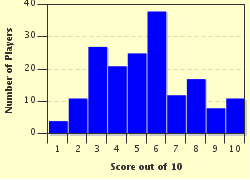Quiz Answer Key and Fun Facts
1. In which of these cities are you most likely to hear the following proposal: "Vill du gifta dig med mig?"
2. Which of these would be least likely to be given as a romantic gift in Warsaw?
3. Which of these questions might be overheard in Berlin between a romantic pair?
4. In Moscow, which of these is most likely to be given as a romantic gift?
5. Which of these would be heard as a romantic term of endearment in Helsinki?
6. Which of these propositions would be most romantic from a Spaniard?
7. Which of these is least likely to be given as a romantic gift in Amsterdam?
8. Which of these words would a Frenchman least likely use as a term of endearment for his partner?
9. In which European capital are you most likely to hear the following promise: "Ljubila te bom za vedno"?
10. A worried Italian asks his loved one "Mi ami?" - "Do you love me?" Which of these answers would break his heart?
Source: Author
reeshy
This quiz was reviewed by FunTrivia editor
stedman before going online.
Any errors found in FunTrivia content are routinely corrected through our feedback system.


